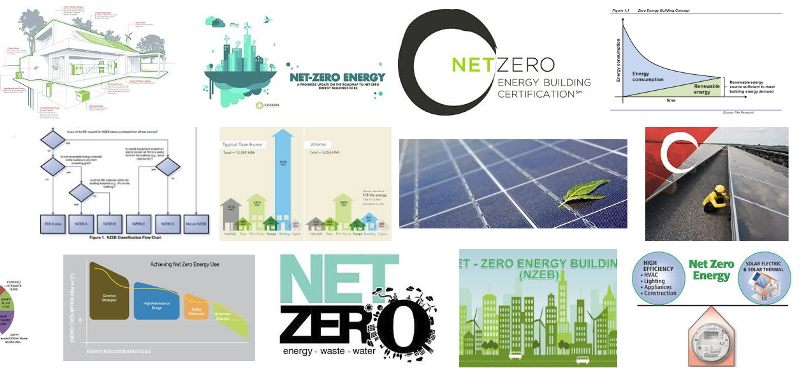Net Zero Energy Policy: Difference between revisions
Siterunner (talk | contribs) No edit summary |
Siterunner (talk | contribs) No edit summary |
||
| Line 61: | Line 61: | ||
[https://energy.gov/sites/prod/files/2015/09/f26/A%20Common%20Definition%20for%20Zero%20Energy%20Buildings.pdf '''US Department of Energy / National Institute of Building Sciences'''] | |||
Revision as of 02:32, 17 November 2019
A GreenPolicy360 | Green Energy Welcome !
Time for Green Energy Action that Moves Economies toward Eco-nomics and Net Zero Energy Policy
New Zealand jumps out in front ...
100 % Feasible? Yes ... https://medium.com/insurge-intelligence/the-feasibility-of-100-renewable-energy-f624d93e1424
Our new web domain is: www.netzeropolicy.com
○ ○ ○ ○ ○ ○ ○ ○ ○ ○ ○ ○ ○ ○ ○ ○ ○ ○ ○ ○ ○ ○ ○
Going Green, Going toward NetZero Use of Energy
A zero-energy building, also known as a zero net energy (ZNE) building, net-zero energy building (NZEB), or net zero building, is a building with zero net energy consumption ...
The total amount of energy used by the building on an annual basis is roughly equal to the amount of renewable energy created on the site.
Net-Zero Buildings Are Catching On
Once a Fringe Idea, Net-Zero Energy Buildings Will Soon Be the Law
"Green Equity" -- Nasdaq provides environmental indexes, tracking the growing clean-energy sector
○
Net Zero Definition
US Department of Energy / National Renewable Energy Laboratory
US Department of Energy / National Institute of Building Sciences
○ ○ ○ ○ ○ ○ ○ ○ ○ ○ ○ ○ ○ ○ ○ ○ ○ ○ ○ ○ ○ ○ ○ ○ ○ ○
As a MediaWiki site, GreenPolicy360 begins with a quick Wikipedia review of ...
'Zero-energy', low-energy, energy conservation, energy transition, and best green energy practices
- Autonomous buildings
- Building-integrated photovoltaics
- Deep energy retrofit
- Earthship
- Ecocities -- Sustainable Cities
- Energy conservation
- Energy Neutral Design
- Environmental design
- Environmental economics
- Green building
- Home energy monitor
- Life cycle analysis
- Low-energy building Low-energy building techniques
- Low-carbon economy -- Low-fossil-fuel economy -- Debarbonized economy
- Low-energy house
- Natural Building
- Off-the-grid
- Passive cooling
- Passive house (Passivhaus standard)
- Passive solar building design
- Passive solar
- Peak oil
- Plug load
- Sustainable design
○ ○ ○ ○ ○ ○ ○ ○ ○ ○ ○ ○ ○ ○ ○ ○ ○ ○ ○ ○ ○ ○ ○ ○ ○ ○
○ ○ ○ ○ ○ ○ ○ ○ ○ ○ ○ ○ ○ ○ ○ ○ ○ ○ ○ ○ ○ ○ ○ ○ ○ ○
California out in front in a Green future
● https://www.greenpolicy360.net/w/California_out_in_front_in_a_Green_future
California 'Out in Front' on Climate and Zero Net Energy Priorities
● http://newbuildings.org/sites/default/files/GovernorOffice_RandallWinstonZNE_Presentation071613.pdf
Going Green, beginning in the early days of the modern environmental movement...
"I have a continuing commitment to specific programs and policies that reduce California’s dependence on foreign oil, increase the diversity and resilience of our energy supply and ease the impact of rising energy costs on California...
Making existing buildings more efficient is a large and quickly tapped energy source... New homes and new appliances must be energy efficient and affordable...
Wind energy can help us move away from reliance on oil. California should maintain its leadership in developing energy projects using bio-gas and agricultural wastes.
Solar energy has a wide range of cost-effective applications..."
-- Governor Jerry Brown, 1981 California Clean Energy Plan
○ ○ ○ ○ ○ ○ ○ ○ ○ ○ ○ ○ ○ ○ ○ ○ ○ ○ ○ ○ ○ ○ ○ ○ ○ ○
Microsoft's Bill Gates Shares His Vision of a Future Energy Plan
Bill Gates Environmental Math and Getting to Zero CO2
In this video Bill Gates gives his speculation that there will be a massive innovation in energy consumption and energy production. Since this video is only two minutes long, go ahead and watch it now.
He proposes a very simple argument using this formula:
P * S * E * C = CO2
Where:
P = Number of People in the world
S = Services consumed per person
E = Energy consumed per service
C = CO2 Produced per unit energy.
CO2 = Total Global CO2 Production
○
- Best Practices
- Best practice system
- Building Standards
- California
- City Governments
- Climate Policy
- Eco-nomics
- Ecology Studies
- Education
- EOS eco Operating System
- Energy
- Environmental Security, National Security
- Green Politics
- LEED
- New Zealand
- Planet Citizen
- Renewable Energy
- Resilience
- Solar Energy
- Sustainability Policies




